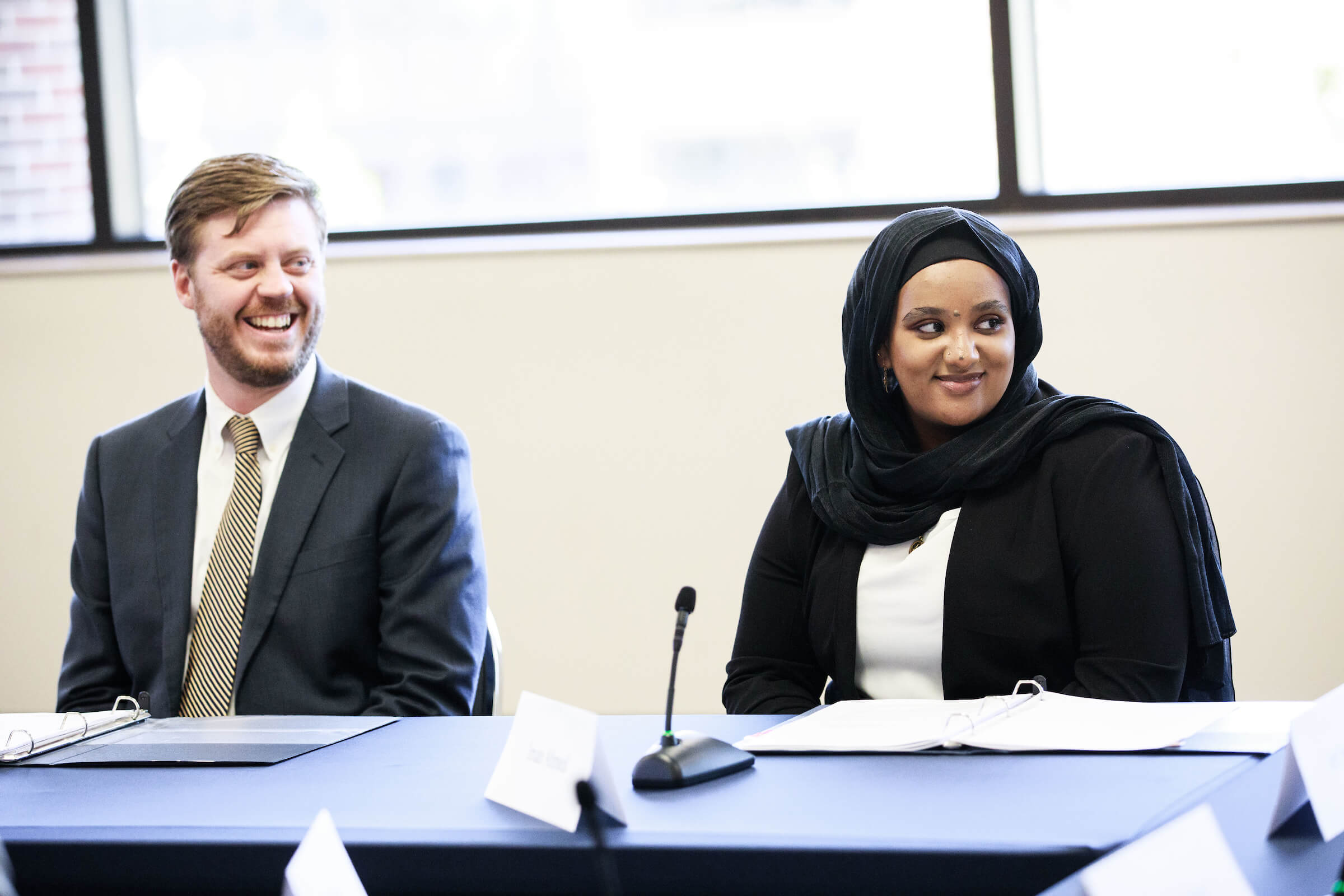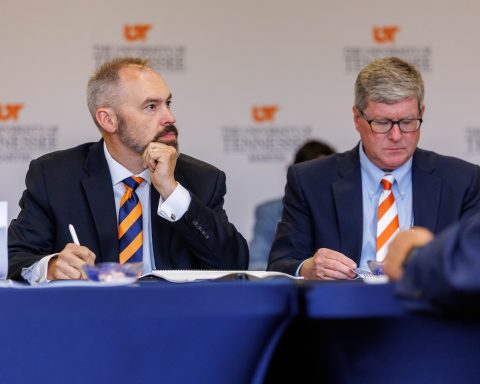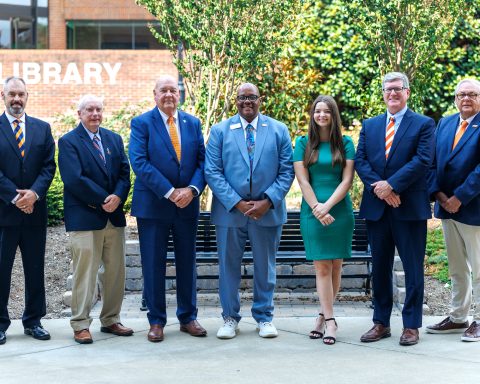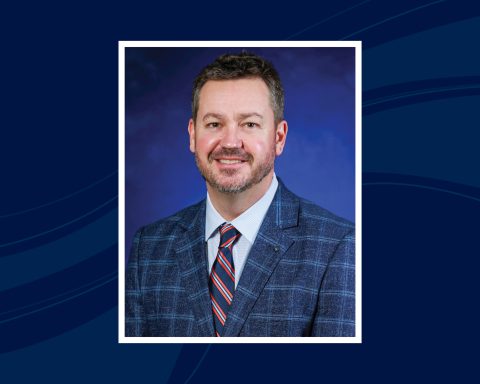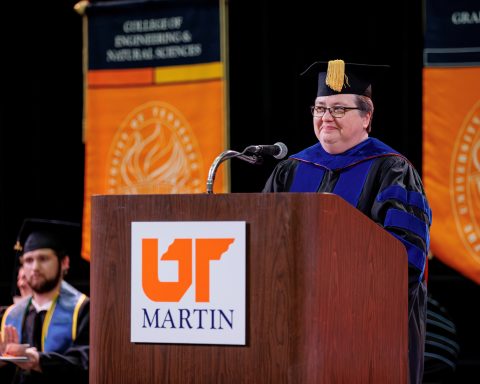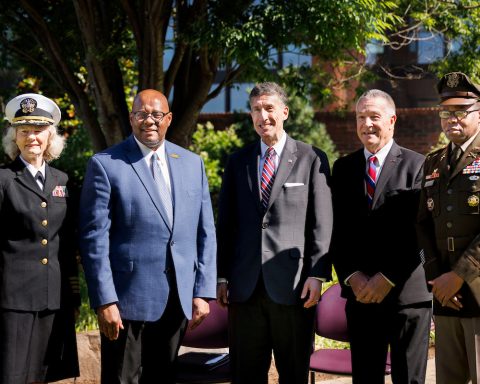A fall enrollment report and review of the University of Tennessee at Martin’s updated strategic plan were among the agenda items presented during Friday’s fall meeting of the University of Tennessee at Martin Advisory Board. Updates on the university’s Title IX work and capital projects were also presented to board members during the 1 p.m. meeting held Sept. 23 in the Boling University Center.
Advisory boards were created for each University of Tennessee campus under the UT FOCUS Act passed during Gov. Bill Haslam’s administration. Board members are appointed by the governor, confirmed by the Tennessee general assembly, and advise the chancellors, UT president and UT Board of Trustees on matters related to the university campuses.
Dr. Philip Acree Cavalier, provost and senior vice chancellor for academic affairs, reported that UT Martin fall enrollment reached 6,868 students, which was the first fall-to-fall enrollment increase for the university since the pandemic began in 2020. Most of the increases compared to fall 2021 numbers came from first-time, first-year students, graduate students and transfers. New graduate student enrollment reached an all-time high of 268 students. Meanwhile the university’s undergraduate retention rate also increased from 70 to 71%.
“That (retention rate increase) sounds like a small increase but that’s real students and a lot of work,” Cavalier said of the retention number, crediting Dr. Brad Baumgardner, the university’s new director of retention, and the Office of Student Success Center staff for their work enrolling 268 eligible students for fall semester.
Cavalier also previewed the university’s newly updated strategic plan that builds on the existing plan and aligns UT Martin with the UT System strategic plan through 2025 when all UT campuses will begin a new strategic-planning process. In the only board action for this meeting, board members unanimously approved the updated plan that moves next to the UT Board of Trustees for review and consideration for approval when the board meets Oct. 27-28 on the UT Martin main campus.
Dominique Crockett, director for the Office of Equity and Diversity, referenced the university’s annual Title IX report as she updated advisory board members on related progress and initiatives at the university. Title IX prohibits sex-based discrimination in any school or other educational program that receives federal government funding.
Crockett, who came to the university earlier this year from the UT Health Science Center in Memphis, reported a 100% completion rate for faculty and staff who received training that covered UT Martin’s sexual misconduct policy. This was the highest completion rate in the UT System and, in addition to faculty and staff, approximately 1,200 students also completed the same training. She continues outreach efforts across the university to increase Title IX training and awareness.
Petra McPhearson, senior vice chancellor for finance and administration, followed with a capital-projects update and reported $130 million in projects either recently completed or underway. Among the projects she highlighted were major system upgrades in Clement Hall, which was built in 1957 and where an open house earlier in the day welcomed visitors to see newly updated space that centralizes academic records, undergraduate admissions, the bursar’s office, financial aid and other key student-services areas. She also noted a two-part project that added security upgrades, including installation of cameras around the main campus and door locks that allow classrooms to be locked from the inside.
McPherson also previewed future projects that include an indoor batting facility for Skyhawk baseball, the Grove Apartments demolition, upgrades in the Johnson EPS Building and Elam Center lighting, and construction of the new Tennessee Entrepreneurial Science and Technology Hub. The TEST Hub was fully funded by the Tennessee General Assembly during the last legislative session.
In his closing comments, Chancellor Keith Carver noted the atmosphere around the university following two years of uncertainty caused by the pandemic. “It feels like this summer and fall that we’re actually a residential college again,” he told advisory board members. He cited successful summer camps and full participation in the university’s two governor’s schools that preceded increased fall enrollment, 90% occupancy in residence halls and an increase of 180 residents on campus compared to a year ago.
Carver also noted positive signs in fundraising support by university donors and alumni. “I can’t say enough about the work of our advancement team but also our faculty, staff and students who are all deputized alumni and development officers,” he said. He expects the university to close out the current $175 million RISE Capital Fundraising Campaign early next year.
“I’m closing in on the end of year six as chancellor, and it seems to be more exciting when you look at what’s happening in (student) retention, when you look at recruiting, when you look at new industry coming into this area, the success our student (organizations) are having and athletics, the way our alums are responding – it is a great day to be a Skyhawk, and I’m so happy to be here,” he said.
Art Sparks, of Union City, chairs the seven-member board and is serving his third term as chair. Other advisory board members are Dr. Anderson Starling, faculty representative to the board; Iman Ahmed, UT Martin student representative to the board; Hal Bynum, of Sharon; Monice Hagler, of Memphis; Julia Wells, of Jackson; and Johnny Woolfolk, of Madison County.
Archived meeting agendas, minutes and meeting webcasts, including the Sept. 23 meeting webcast, are found at www.utm.edu/advisoryboard. Select the “Agenda and Meeting Materials” menu link for archived content. The winter meeting of the board is set for Jan. 20, 2023. Call the UT Martin Office of University Relations at 731-881-7615 for additional assistance or information.
###

